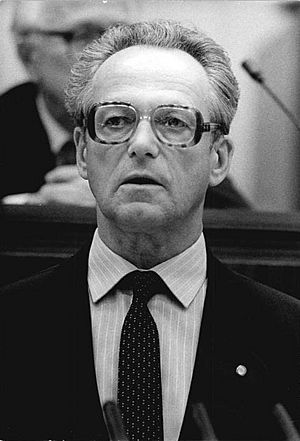Manfred Gerlach facts for kids
Quick facts for kids
Manfred Gerlach
|
|
|---|---|

Gerlach in June 1986
|
|
| Leader of the Liberal Democratic Party of Germany |
|
| In office 27 November 1967 – 10 February 1990 |
|
| Preceded by | Max Suhrbier |
| Succeeded by | Rainer Ortleb |
| Chairman of the State Council | |
| In office 6 December 1989 – 5 April 1990 |
|
| Chairman of the Council of Ministers |
Hans Modrow |
| Preceded by | Egon Krenz |
| Succeeded by | Position abolished Sabine Bergmann-Pohl (as interim head of state) |
| Member of the Volkskammer for Leipzig (Saxony; 1949–1952) |
|
| In office 7 October 1949 – 5 April 1990 |
|
| Preceded by | Position established |
| Succeeded by | Constituency abolished |
| Personal details | |
| Born | 8 May 1928 Leipzig, Saxony, Weimar Republic (now Germany) |
| Died | 17 October 2011 (aged 83) Berlin, Germany |
| Political party | Independent |
| Other political affiliations |
Free Democratic Party (1990–1993) Association of Free Democrats (1990) Liberal Democratic Party of Germany (1945–1990) |
| Residence | Gommern |
| Occupation |
|
Manfred Gerlach (born May 8, 1928 – died October 17, 2011) was a German lawyer and political leader. He was the longtime head of the Liberal Democratic Party of Germany, a political party in East Germany. From December 6, 1989, to April 5, 1990, he served as the Chairman of the Council of State, which meant he was the head of state of East Germany.
Early Life and Education
Manfred Gerlach was born in Leipzig, Germany. During World War II, he was part of a group that secretly worked against the government. After the war, he studied law from 1951 to 1954. He also worked as an editor for a newspaper in Halle/Saale. In 1964, he earned his doctorate degree, and later became a professor in 1984.
Political Journey
Gerlach helped start two important groups in Leipzig: the Liberal Democratic Party of Germany (LDPD), which was a political party, and the Free German Youth (FDJ), a youth organization. From 1946 to 1950, he led the LDPD youth group in North-West Saxony. He was also a member of the LDPD's executive council in Saxony from 1947 to 1952.
In the 1950s, he served as a mayor in the city of Leipzig. He became the LDPD's vice-chairman until 1953, and then its General Secretary from 1954 to 1967. In 1967, he was chosen as the chairman of the LDPD, a position he held until February 10, 1990.
From 1949 to 1990, Gerlach was a member of the People's Chamber, which was like the parliament of East Germany. He was also a deputy chairman of the State Council of East Germany from 1960 to 1990. This role was similar to being a vice-president.
Changing Views
At first, Gerlach supported the main communist party in East Germany, the Socialist Unity Party of Germany (SED). This party wanted to control all other groups. However, in the late 1970s, he started to move away from completely agreeing with the SED. Under his leadership, the LDPD began to make small connections with similar parties in West Germany. Even so, he supported the government taking over the last private businesses.
Gerlach was happy about the new, more open ideas coming from the Soviet Union, led by Mikhail Gorbachev. His support for more freedom and different ideas in East Germany made him quite popular. But he lost some of this popularity because he was slow to react during the big changes in 1989 that led to the fall of the SED government.
Head of State
On October 13, 1989, Gerlach was the first important East German politician to publicly question if the SED should have all the power. A few days later, on October 18, the SED leader Erich Honecker was removed from his position. After the Berlin Wall fell, Gerlach was chosen as the chairman of the Council of State. This made him the first leader of East Germany who was not from the main communist party and wasn't just filling in temporarily. He held this job until April 1990, when the Council of State was ended before East and West Germany became one country again.
In March 1990, Gerlach's party and two other liberal parties joined together to form the new Association of Free Democrats. This group later became part of the West German FDP after Germany was reunified. In November 1993, Gerlach left the FDP party. After that, his political ideas became similar to those of the Party of Democratic Socialism, which was the former SED.
Gerlach also supported a group that wanted to show the history of East Germany in a more positive way. Some people criticized these writings, saying they made the old communist government seem better than it was.
Gerlach received many awards from East Germany, including the Patriotic Order of Merit and the Star of People's Friendship in 1964 and 1988, and the Order of Karl Marx in 1988.
Death
Manfred Gerlach passed away on October 17, 2011, in Berlin, at the age of 83, after a long illness.
See also
 In Spanish: Manfred Gerlach para niños
In Spanish: Manfred Gerlach para niños
 | Stephanie Wilson |
 | Charles Bolden |
 | Ronald McNair |
 | Frederick D. Gregory |

